新编英语教程 5 Unit 6 背景知识之Uniform Grading System
新编英语教程5Unit1-8课文及译文参考
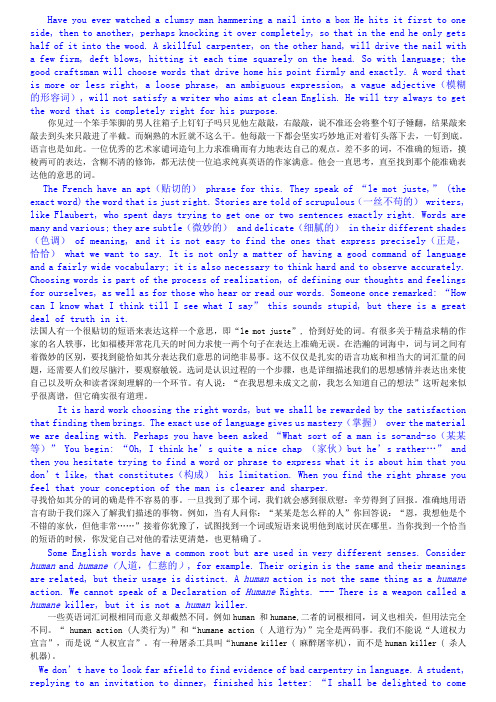
Have you ever watched a clumsy man hammering a nail into a box He hits it first to one side, then to another, perhaps knocking it over completely, so that in the end he only gets half of it into the wood. A skillful carpenter, on the other hand, will drive the nail with a few firm, deft blows, hitting it each time squarely on the head. So with language; the good craftsman will choose words that drive home his point firmly and exactly. A word that is more or less right, a loose phrase, an ambiguous expression, a vague adjective(模糊的形容词), will not satisfy a writer who aims at clean English. He will try always to get the word that is completely right for his purpose.你见过一个笨手笨脚的男人往箱子上钉钉子吗只见他左敲敲,右敲敲,说不准还会将整个钉子锤翻,结果敲来敲去到头来只敲进了半截。
而娴熟的木匠就不这么干。
他每敲一下都会坚实巧妙地正对着钉头落下去,一钉到底。
语言也是如此。
一位优秀的艺术家谴词造句上力求准确而有力地表达自己的观点。
差不多的词,不准确的短语,摸棱两可的表达,含糊不清的修饰,都无法使一位追求纯真英语的作家满意。
新编英语教程 第五册教案 PPT1-10单元
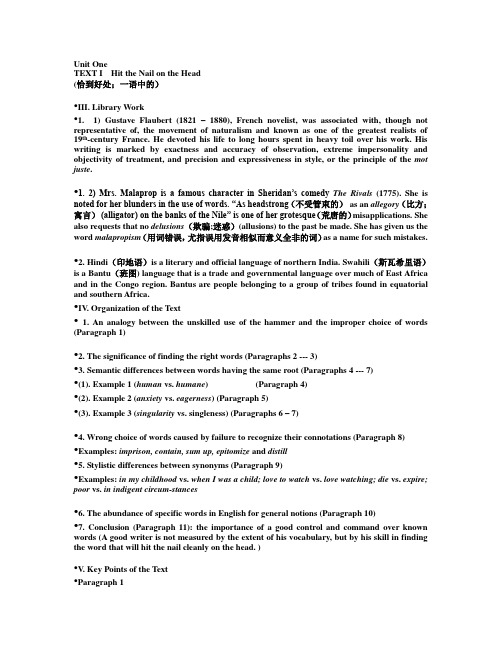
Unit OneTEXT I Hit the Nail on the Head(恰到好处;一语中的)•III. Library Work•1. 1) Gustave Flaubert (1821 –1880), French novelist, was associated with, though not representative of, the movement of naturalism and known as one of the greatest realists of 19th-century France. He devoted his life to long hours spent in heavy toil over his work. His writing is marked by exactness and accuracy of observation, extreme impersonality and objectivity of treatment, and precision and expressiveness in style, or the principle of the mot juste.•1. 2) Mrs. Malaprop is a famous character in Sheridan’s comedy The Rivals(1775). She is noted for her blunders in the use of words. ―As headstrong(不受管束的)as an allegory(比方;寓言)(alligator) on the banks of the Nile‖ is one of her grotesque(荒唐的)misapplications. She also requests that no delusions(欺骗;迷惑)(allusions) to the past be made. She has given us the word malapropism(用词错误,尤指误用发音相似而意义全非的词)as a name for such mistakes. •2. Hindi(印地语)is a literary and official language of northern India. Swahili(斯瓦希里语)is a Bantu(班图) language that is a trade and governmental language over much of East Africa and in the Congo region. Bantus are people belonging to a group of tribes found in equatorial and southern Africa.•IV. Organization of the Text•1. An analogy between the unskilled use of the hammer and the improper choice of words (Paragraph 1)•2. The significance of finding the right words (Paragraphs 2 --- 3)•3. Semantic differences between words having the same root (Paragraphs 4 --- 7) •(1). Example 1 (human vs. humane) (Paragraph 4)•(2). Example 2 (anxiety vs. eagerness) (Paragraph 5)•(3). Example 3 (singularity vs. singleness) (Paragraphs 6 – 7)•4. Wrong choice of words caused by failure to recognize their connotations (Paragraph 8) •Examples: imprison, contain, sum up, epitomize and distill•5. Stylistic differences between synonyms (Paragraph 9)•Examples: in my childhood vs. when I was a child; love to watch vs. love watching; die vs. expire; poor vs. in indigent circum-stances•6. The abundance of specific words in English for general notions (Paragraph 10)•7. Conclusion (Paragraph 11): the importance of a good control and command over known words (A good writer is not measured by the extent of his vocabulary, but by his skill in finding the word that will hit the nail cleanly on the head. )•V. Key Points of the Text•Paragraph 1•knock over: hit … to fall 捶翻•drive something home: force (the nail) into the right place; make something unmistakably clear 把(钉子等)打入;使明确无误•E.g. (1). He slammed the door and drove the bolt home. 他砰地关上门,把门闩插好。
高考总复习英语(人教版)教师用书必修5Unit2TheUnitedKingdom

Unit 2The United Kingdom(对应学生用书P112)[话题单词] 1.kingdom n.王国2.nation n. 民族,国家3.geography n. 地理4.landmark n. 地标性建筑5.symbol n. 象征6.defend v. 保护,保卫7.gain v. 得到,获得8.ancient adj. 古老的9.traditional adj. 传统的10.coastal adj. 沿海的11.historic adj. 历史上著名的12.boundary n. 分界线,边界13.canal n. 运河;管道14.ceremony n. 典礼,仪式,礼节,礼仪15.coast n. 海岸,海滨[话题短语]1.at one time一度,曾经2.be located/situated in/lie in位于……3.be surrounded by被……所环绕4.be made up of由……组成5.be famous/wellknown for以……闻名6.have a population of有……人口7.be separated from把……分离8.give way to让位于;给……让路9.go to pieces崩溃,瓦解;身体垮台10.in advance of在……的前面;超过11.in the course of在……期间,在……过程中12.places of interest名胜13.in the long run从长远来看,最后14.under the leadership of在……领导/关心下15.behind the times落在时代后面[话题佳句]1.The UK lies in the northwest of Europe and is seperated from the Europe Continent by English Channel.英国位于欧洲西北部,英吉利海峡把它与欧洲大陆分开。
新编英语教程 5 Unit 6 背景知识之American’s college entrance exam

American’s educational career: kindergarten or nursery school led to elementary school, then to a middle school or junior high school, which was followed by high school and now college.What kind of student are colleges seeking?Most colleges prefer that in high school a student acquire a solid foundation in the basics -- four years of English, courses in history, science, mathematics, and, more and more frequently, foreign language. Admissions people expect that a student will have strong reading, writing, and math reasoning skills, and some degree of comfort with scientific process and laboratory equipment. But, beyond these basics, according to the College Entrance Examination Board, "Colleges seek to put together a community of young people who are alive -- who think, create, interact, share, and care." (Scott Gelband, Catherine Kubale, Eric Schorr, Your College Application, New York, College Entrance Examination Board, 1991, p. 6) Does that begin to sound like the typical homeschooler? I think it does, and here's why:Learning experiences for a student at home are not limited to five hours of class work Monday through Friday. For the home schooled student, the world is the classroom. The homeschooled student has "lived a full life, made choices, distinguished among options. [He or she has] become a growing, thinking person unlike any other." (Gelband, Kubale, Schorr, p. 6)Colleges are beginning to see this as well. Oklahoma State University, according to Grace Llewellyn, sends a recruiter specifically to interview homeschoolers. (Grace Llewellyn, The Teenage Liberation Handbook; How to Quit School and Get a Real Life and Education, Lowry House, Eugene, Oregon, 1991, p. 262) Boston University has solicited homeschoolers through Home Education Magazine. Hampshire College will make a campus visit to Clonlara School this fall. As home schoolers go to colleges and universities and do well, other colleges and universities are beginning to actively recruit home schoolers as well.Homeschoolers do well in college because they have had the kind of preparation which enables them to do well. They travel and use the community (even the world) as the classroom. They discuss their experiences with family and friends, do actual hands-on work, read newspapers and magazines, write letters, become involved in local issues that affect their communities, play games, and engage in all sorts of active learning situations.College entrance examinations are administered by independent agencies and are given at test sites throughout the country five or six times throughout the school year. These sites are usually high schools or junior colleges, but the testing agencies have no connections with these schools.The college entrance examinations are required in order for a student to be considered for admission to some colleges. They are recommended by other colleges. Some colleges do not require them at all. The colleges that use these tests look upon them as a way to measure on the same standard students of widely differing backgrounds. High test scores will send a clear message to the college admissions people that the student has the ability to do well in college. About 7.23 million high school graduates begin to sit the two-day national college entrance examinations in China June 7, 2004.。
新编英语教程5(第三版李观仪)Unit1-8课文及译文参考
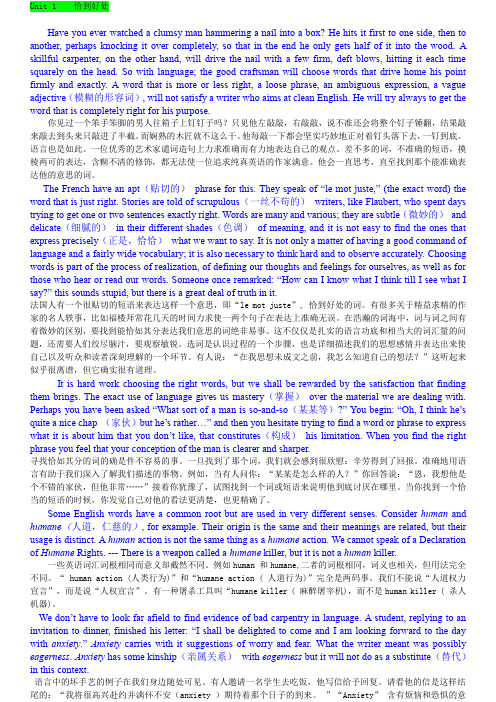
Unit 1 恰到好处Have you ever watched a clumsy man hammering a nail into a box? He hits it first to one side, then to another, perhaps knocking it over completely, so that in the end he only gets half of it into the wood. A skillful carpenter, on the other hand, will drive the nail with a few firm, deft blows, hitting it each time squarely on the head. So with language; the good craftsman will choose words that drive home his point firmly and exactly. A word that is more or less right, a loose phrase, an ambiguous expression, a vague adjective(模糊的形容词), will not satisfy a writer who aims at clean English. He will try always to get the word that is completely right for his purpose.你见过一个笨手笨脚的男人往箱子上钉钉子吗?只见他左敲敲,右敲敲,说不准还会将整个钉子锤翻,结果敲来敲去到头来只敲进了半截。
而娴熟的木匠就不这么干。
他每敲一下都会坚实巧妙地正对着钉头落下去,一钉到底。
语言也是如此。
一位优秀的艺术家谴词造句上力求准确而有力地表达自己的观点。
新编英语教程5课文翻译(unit115)(学生必备)

Unit 1 hit the nail on the head 恰到好处Have you ever watche d a clumsy man hammer ing a nail into a box? He hits it firstto one side, then to anothe r, perhap s knocki ng it over compl e t ely,so that in the end he only gets half of it into the wood. A skill f u l carpen ter, on the otherhand, will drivethe nail with a few firm, deft blows,hittin g it each time square ly on the head. So with langua ge; the good crafts man will choose wordsthat drivehome his pointfirmly and exactl y. A word that is more or less right,a loosephrase, an ambigu ous expres sion,a vagueadject ive(模糊的形容词), will not satisf y a write r who aims at cleanEnglis h. He will try always to get the word that is comple telyrightfor his purpos e.你见过一个笨手笨脚的男人往箱子上钉钉子吗?只见他左敲敲,右敲敲,说不准还会将整个钉子锤翻,结果敲来敲去到头来只敲进了半截。
新编英语教程5 unit six

Paragraph 13
• clinch: (in the sport of boxing) the position of the two fighters when holding each other too tightly, with the arms
(拳击等的)用臂钳住对手
• E.g.: The fighters were in a clinch.
2.
Paragraph 4
• the rudiments: the basics (pl. )
• 基础;基本原理入门
• E.g., he mastered the rudiments of geometry.
• 他掌握了几何学入门。
Paragraph 4 • When I knocked …even more questions • When I got ready to enter college, I was expecting a college education in some definite fields. I was very eager to know the answers to some questions difficult to understand, and that has made me work and improve myself; esp. in areas of study where there were no prompt answers, but endless questions.
Learning is a long-range process. Cramming for an examination in the last minute does one no good.
新编英语教程5unitten
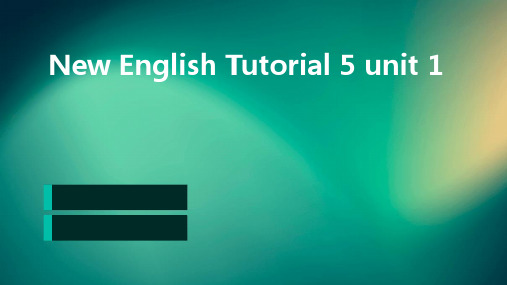
02
社会变革
工业革命带来了许多社会变革,如城市化、人口流动、工人权益等问题。
本单元将深入探讨这些变革对当时社会和人们生活的影响。
03
环境问题
工业革命也带来了严重的环境问题,如空气污染、水污染和土地资源的
过度开发。本单元将分析这些环境问题的成因和后果,以及当时的政府
和社会如何应对这些问题。
03 Vocabulary learning
05 reading comprehension
Reading materials
Textbook
The New English Tutorial 5, unit 1 provides a selection of reading materials, including articles, essays, and short stories, covering a range of topics and genres.
• Responsibility - The Captain or a designated member of the crew must oversee the lifeboat drill. They will ensure that all crew members are present and participate, and will complete a checklist to verify that all aspects of the drill have been properly carried out.
• Procedure - The lifeboat drill is a safety measure that must be carried out on board a ship. It involves checking the lifeboat and its equipment, and ensuring that all crew members know how to use it in case of an emergency.
新编英语教程第5册unit10
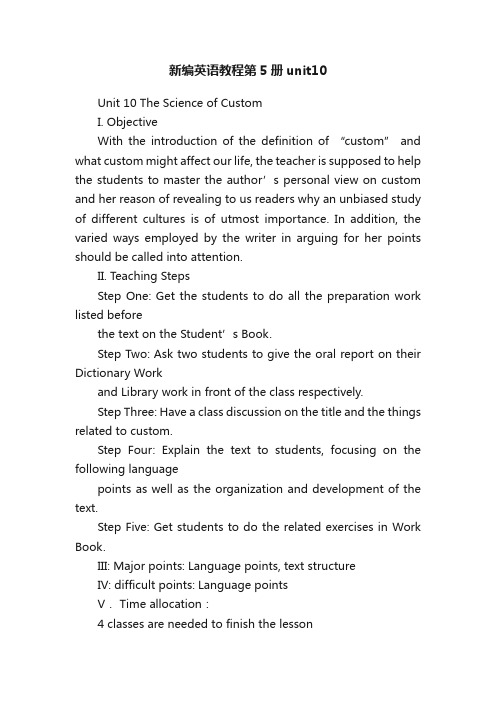
新编英语教程第5册unit10Unit 10 The Science of CustomI. ObjectiveWith the introduction of the definition of “custom” and what custom might affect our life, the teacher is supposed to help the students to master the author’s personal view on custom and her reason of revealing to us readers why an unbiased study of different cultures is of utmost importance. In addition, the varied ways employed by the writer in arguing for her points should be called into attention.II. Teaching StepsStep One: Get the students to do all the preparation work listed beforethe text on the Student’s Book.Step Two: Ask two students to give the oral report on their Dictionary Workand Library work in front of the class respectively.Step Three: Have a class discussion on the title and the things related to custom.Step Four: Explain the text to students, focusing on the following languagepoints as well as the organization and development of the text.Step Five: Get students to do the related exercises in Work Book.III: Major points: Language points, text structureIV: difficult points: Language pointsV. Time allocation:4 classes are needed to finish the lessonVI Background KnowledgeTime needed: 45 minutesTeaching approaches: asking questions, group discussions, PPT1.Ruth Benedict (author)(See p148 of SB)2.John Dewey(L29)a.1859-1952;b.U.S. philosopher, psychologist, and educator;c.One of the founders of the philosophical school of pragmatism;d.Representative of the progressive movement in U.S. education;3.custom(L18)a.Meaning: (U.) usual and generally accepted behaviour among members of a socialgroup;b.Meaning: (C.) a particular way of behaving which, because it has long beenestablished, is observed by individuals and social groups;4.cacti (L50)a Meaning: a thick fleshy plant that grows in deserts;c.Singular Form: cactus5.nebulae(L50)a.Meaning: a cloud of dust and gas in space;b.Singular Form: nebulaThe following four items are from the P. 73 of TB6.custom(L18)a.Meaning: a habit or practice that has come to be associated with an individualor a group by reason of its long continuance, its uniformity of character, and sometimes its compulsory nature;b.Example: It is his custom to smoke each evening after dinner.7.habit(L39)a.Meaning: the way of an individual than to the way of a community;b.Example: He has acquired the habit of clearing his throat before he speaks inpublic.8.Behavior(L20)a.Meaning: a person’s actions in general or on a particular occasion;b.Example: His behavior is very ridiculous.9.institution(L27)a.Meaning: a habit, custom, etc., which has been in existence for a long time;b.Example: The institution of slavery was once widespread in the south of the UnitedStates.10.Sea Dyaks(L7)Meaning: another name for the Iban people, an indigenous peopleinhabiting parts of Borneo, an island in the Malay Archipelago.11New Guinea tribe(L9)Meaning: the second largest island in the world to the north of Australia;.VII Language pointsTime needed: 90minutes.Teaching approaches: examples, explanation, and application1.anthropology(L1)a.Meaning: the scientific study of people, society, and cultureb.Derivative: anthropologist (n.) anthropological (adj.)2.be bound to (L11)a. a phraseb.Meaning: something is certain to happen;c.Example: There are bound to be price increases next year.3.weighting(L11)a.Meaning: to bias or slant to a particular direction, as in order to favor someone;b.Example: The current electoral law is still heavily weighted in favor of theruling party.4.. gamut(L13)a.Meaning: the complete range of something, a great variety of something;b.Example: I experienced the gamut of emotions.5.aberrant(L23)a.Meaning: deviating from what is usual or normalb.Example: His rages and aberrant behavior worsened.6.pristine(L26)a.Meaning: unchanged by later developments, pureb.Example: It’s impossible for any people to view all things with pristine eyes.7.vernacular(L33)a.Meaning: everyday language or speech;b.Example: He loves reading books written in the vernacular.8.autonomous(L34)a.Meaning: govern or control itself rather than being controlled;b.Example: They proudly declared themselves part of a new autonomous province.9.accommodation(L36)a.Meaning: adaptation;b.Example: The government will provide temporary accommodation for people sleepingrough in London.10.incumbent(upon someone) (L43)a.Meaning: being the duty or responsibility of someone;b.Example: It is incumbent upon all of us as loyal citizens to make an extra effort.11.unintelligible(L45)a.Meaning: not understandable;b.Example: All written by this guy is unintelligible.12.preliminary(L46)a.Meaning: activities taken at the very beginning;b.Example: Preliminary talks on the future will begin next day.13.proposition(L46)a.Meaning: a statement or an idea one can consider or discuss to decide if it istrue;b.Example: The proposition that democracies do not fight each other is based ona tiny historical sample.14.preferential (L48)a.Meaning: be treated better than other people; have an advantage over somebody;b.Example: Despite her position, she is not supposed to begiven any preferentialtreatment.15.variant(L54)a.Meaning: a different of something;b.Example: There are so many variant spellings of his name.16.premise(L61)a.Meaning: something one uses as a basis for developing an idea;b.Example: The programme started from the premise that men and women are on equalterms in this society.17. hold sway over(L57)a. a phraseb.Meaning: have control over;c.Example: A completely different approach seems to hold sway.VIII. Organization and Development and text studyTime needed: 90 minutesTeaching approaches: asking questions, group discussions, PPT, paraphrasingPart One: IntroductionParagraph 1: The author gives the definition of anthropology.Part Two: BodyParagraph2: The author emphasizes the distinguishing mark of anthropology since it is a serious study involving other societies than America.Paragraph3: Custom plays a predominant role in a lot of ways.Paragraph4: The author discusses the difficulties for any person to look at the world with pristine eyes.Paragraph5: The precondition for any scientific study is thatthere be no preferential weighting of one or another of the items in the series it selects for its consideration.Part Three: ConclusionParagraph6: The author concludes the article by calling them Americans not to be held sway by any biased attitude in the field of anthropology.IX: Home work:Finish the exercises on work bookX: Contents tested:1. Language points2.paraphrases。
新编英语教程5课文翻译(unit6~12)
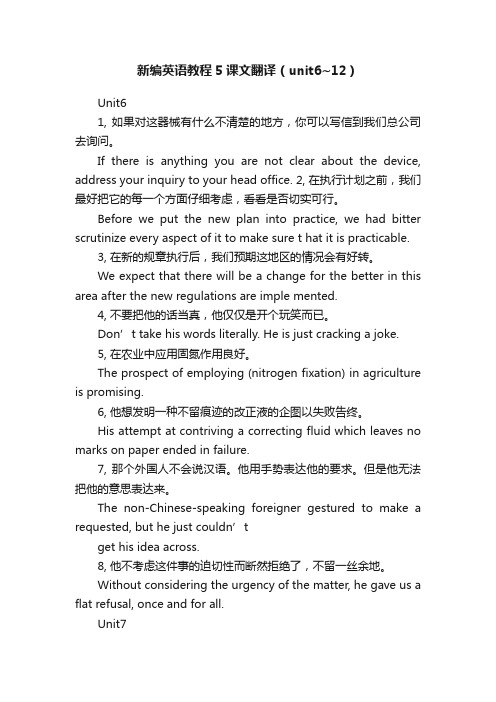
新编英语教程5课文翻译(unit6~12)Unit61, 如果对这器械有什么不清楚的地方,你可以写信到我们总公司去询问。
If there is anything you are not clear about the device, address your inquiry to your head office. 2, 在执行计划之前,我们最好把它的每一个方面仔细考虑,看看是否切实可行。
Before we put the new plan into practice, we had bitter scrutinize every aspect of it to make sure t hat it is practicable.3, 在新的规章执行后,我们预期这地区的情况会有好转。
We expect that there will be a change for the better in this area after the new regulations are imple mented.4, 不要把他的话当真,他仅仅是开个玩笑而已。
Don’t take his words literally. He is just cracking a joke.5, 在农业中应用固氮作用良好。
The prospect of employing (nitrogen fixation) in agriculture is promising.6, 他想发明一种不留痕迹的改正液的企图以失败告终。
His attempt at contriving a correcting fluid which leaves no marks on paper ended in failure.7, 那个外国人不会说汉语。
他用手势表达他的要求。
但是他无法把他的意思表达来。
The non-Chinese-speaking foreigner gestured to make a requested, but he just couldn’tget his idea across.8, 他不考虑这件事的迫切性而断然拒绝了,不留一丝余地。
新编英语教程5(第三版李观仪)unit-8课文及译文参考
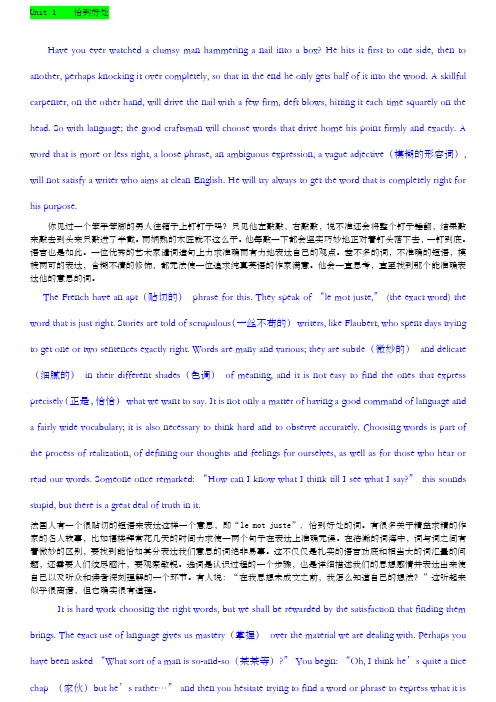
Unit 1 恰到好处Have you ever watched a clumsy man hammering a nail into a box? He hits it first to one side, then to another, perhaps knocking it over completely, so that in the end he only gets half of it into the wood. A skillful carpenter, on the other hand, will drive the nail with a few firm, deft blows, hitting it each time squarely on the head. So with language; the good craftsman will choose words that drive home his point firmly and exactly. A word that is more or less right, a loose phrase, an ambiguous expression, a vague adjective(模糊的形容词), will not satisfy a writer who aims at clean English. He will try always to get the word that is completely right for his purpose.你见过一个笨手笨脚的男人往箱子上钉钉子吗?只见他左敲敲,右敲敲,说不准还会将整个钉子锤翻,结果敲来敲去到头来只敲进了半截。
而娴熟的木匠就不这么干。
他每敲一下都会坚实巧妙地正对着钉头落下去,一钉到底。
语言也是如此。
一位优秀的艺术家谴词造句上力求准确而有力地表达自己的观点。
高级英语综合教程第五册Unit1、2、3、6、8、10、12部分重要词汇表
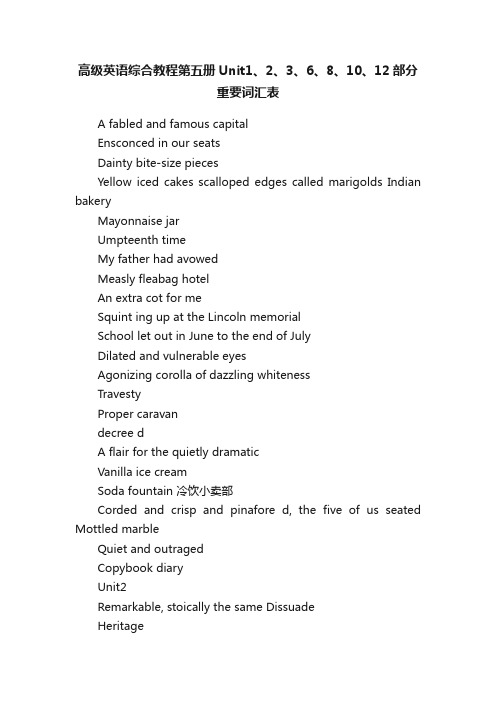
高级英语综合教程第五册Unit1、2、3、6、8、10、12部分重要词汇表A fabled and famous capitalEnsconced in our seatsDainty bite-size piecesYellow iced cakes scalloped edges called marigolds Indian bakeryMayonnaise jarUmpteenth timeMy father had avowedMeasly fleabag hotelAn extra cot for meSquint ing up at the Lincoln memorialSchool let out in June to the end of JulyDilated and vulnerable eyesAgonizing corolla of dazzling whitenessTravestyProper caravandecree dA flair for the quietly dramaticVanilla ice creamSoda fountain 冷饮小卖部Corded and crisp and pinafore d, the five of us seated Mottled marbleQuiet and outragedCopybook diaryUnit2Remarkable, stoically the same DissuadeHeritageForciblyRepressed maniacal child killer Faraway mustinessAncient mothballs or dirty closets PainstakinglyMoc but 毛笔BlotchMultiplication tableNagging loud voiceOutshout the best of the street vendors Her humor was raunchyLilting romanceChaotic and frenziedCluckGibberishPidgin speechInfuriateConsonantTacosUint3A plank bedSquatDrapPuny wispGallowsBayonetCaressing gripBugleBarrackSuperintendentProdding the gravel MagistrateAll toiling away in solemn foolery NooseReiteratedWaverLadle out riceHomely, jolly sceneSniggerEurasianClassy European styleTalking GarrulouslyUtmost satisfactorinessWriggling aboutRefractoryDislodgeHe said quite geniallyAmicablyUnit 6I shall speak forth my sentiments freely Magnitude of the subjectGuilty of TreasonRevereArduousBe disposed to doAnguish of spiritLampSolaceInsidious smilePetitionSnareComportReconciliationThere are the implements of war and subjugation ResortMartial arrayRivetForge the chainEntreaty and humble supplicationI beseech youAvert the stormRemonstrateProstrateImplore its interpositionSlightSpurnPrivileges for which we have been so long contending Pledge So formidable an adversaryLying supinelyDelusive phantomThe battle is not to the strong alone; it is to the vigilant BaseExtenuateGaleBrethrenIdle 无所事事Unit8On a yacht sailingNavigatorMariana TrenchBogged downHazard a guesstimateConventional outletsPiano tunersGuessworkBroadclothPopcorn kernelsUnit 10The screams were so muffledHer face was calm and impassiveLighted her cigaretteHurled accusation at meParanoid schizophrenicHer voice rose in crescendoLaboriouslyBurgeoning gardenHarassing cityPolitical commitmentAdrenaline-induced strengthThe primordial fear of madness lurks deep within Antipsychotic medicationShe has no empathy with her own bodySmoke incessantlyPerpetual headacheCrohn’s disease 阶段性结肠炎A deep inflammation of colonPlagued and humiliatedResponded to this afflictionAppellationAgonizing hallucinationsMost searing nightmaresI feel as though someone took a file and sandpaper and scratched off all my epidermisLoathsomeThis pathetic scarecrow figureGnawingSuperstructureDeadening travailSplattering the grains over the counter(柜台)Peremptorily She whirled and in a shrill toneHemophiliac absurdityI’m not spun of one threadI will do the best I can with the worst I have to live with.Unit 12The provostQuestionnaireReprehensibleRiggedParadoxBeneficent and benevolent social institutions Thesis—theses PrevalentDisk jockeyI have never been surprised to find men Wicked, but I have often been surprised to find them not ashamed. Revealing Bribe-takerPersonaSocial decencySociologyReverseWhatnotAssert。
新编英语教程第五册Unit Six preparing for colleage

I. Library Work
8. A Protestant is a member of the Protestant Church, which is any of the Christian churches that are separate from the Roman Catholic Church. The Protestants reject the authority of the Pope or papacy (教皇统治 They find 教皇统治). 教皇统治 authority in the text of the Bible.
I. Library Work
6. Liberals are people of liberal principles or views, or members of the Liberal Party in Great Britain. Liberals favor progress or reform, as in political or religious affairs.
Paragraph 2
so far as I could make out: so far as I could understand make out: understand, see, or hear E.g.: That problem is just beyond me; I can’t make it out. He muttered a complaint that nobody could make out.
I. Library Work
Trojan War, a legendary war waged anywhere from the 11th to the 14th century B.C. It is also in twenty-four books. 2. Dante Alighieri (1265 – 1321), Italian poet whose reputation rests chiefly on The Divine Comedy (ca. 1309 – 1320), an epic poem that describes his spiritual journey through Hell and Purgatory and finally to Paradise, or the way of an individual soul from sin to purification.
高级英语新编英语教程5课文+翻译unit5

Unit 5 The Plug-in Drug: TV and the American FamilyA quarter of a century after the introduction of television into American society, a period that has seen the medium become so deeply ingrained in American life that in at least one state the television set has attained the rank of a legal necessity, 1safe from repossession in case of debt along with clothes, cooking utensils, and the like, television viewing has become an inevitable and ordinary part of daily life. Only in the early years of television did writers and commentators2have sufficient perspective to separate the activity of watching television from the actual content it offers the viewer. In those early days writers frequently discussed the effects of television on family life. However a curious 3myopia afflicted those early observers: almost without exception they regarded television as a favorable, beneficial, indeed, 4wondrous influence upon the family.在电视机这项发明进入美国人生活的25后,他已经在美国人的生活中根深蒂固,甚至美国至少有一个州的法律规定电视机是生活的必须品,而且如果负债,它可以和衣物,厨具一样免于作为财产抵押,而且看电视也成为人们生活中非常普遍甚至是不可避免的活动。
新编英语教程 5 unit 6

During the 1950s Cousins was outspoken in his criticism of atmospheric nuclear testing. In 1957 he was among the founders and became the first cochairman of the National Committee for a Sane Nuclear Policy (SANE). In the early 1960s he became an unofficial citizen diplomat, facilitating communication between the Vatican, the Kremlin, and the White House which helped to lead to the SovietAmerican nuclear test ban treaty. Upon ratification of the treaty in 1963, President Kennedy publicly thanked Cousins for his help with the treaty, Pope John XXIII awarded Cousins his personal medallion and several other peace awards in the following years in the 1960s.
Ⅱ Library Work
nitrogen fixation(固氮作用): The formation of nitrogenous compounds by the metabolic assimilation of atmospheric nitrogen by certain soil bacteria.
《新编英语教程》教案-第五册-5.12 Custom
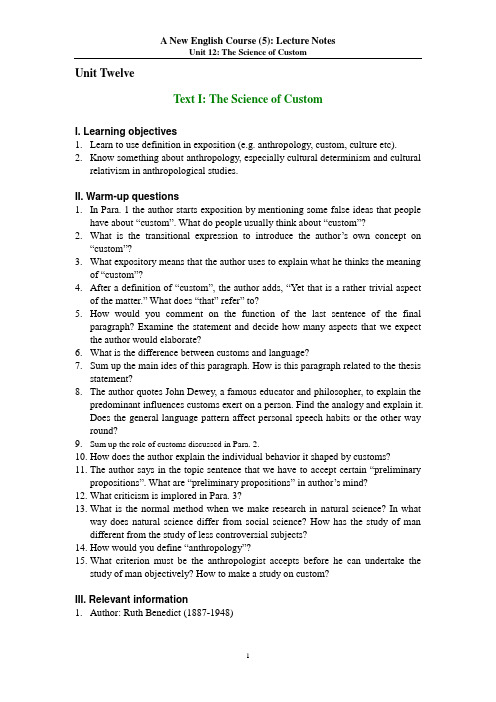
Unit TwelveText I: The Science of CustomI. Learning objectives1.Learn to use definition in exposition (e.g. anthropology, custom, culture etc).2.Know something about anthropology, especially cultural determinism and culturalrelativism in anthropological studies.II. Warm-up questions1.In Para. 1 the author starts exposition by mentioning some false ideas that peoplehave about “custom”. What do people usually think about “custom”?2.What is the transitional expression to introduce the author’s own concept on“custom”?3.What expository means that the author uses to explain what he thinks the meaningof “custom”?4.After a definition of “custom”, the author adds, “Yet that is a rather trivial aspectof the matter.” What does “that” refer” to?5.How would you comment on the function of the last sentence of the finalparagraph? Examine the statement and decide how many aspects that we expect the author would elaborate?6.What is the difference between customs and language?7.Sum up the main ides of this paragraph. How is this paragraph related to the thesisstatement?8.The author quotes John Dewey, a famous educator and philosopher, to explain thepredominant influences customs exert on a person. Find the analogy and explain it.Does the general language pattern affect personal speech habits or the other way round?9.Sum up the role of customs discussed in Para. 2.10.How does the author explain the individual behavior it shaped by customs?11.The author says in the topic sentence that we have to accept certain “preliminarypropositions”. What are “preliminary propositions” in author’s mind?12.What criticism is implored in Para. 3?13.What is the normal method when we make research in natural science? In whatway does natural science differ from social science? How has the study of man different from the study of less controversial subjects?14.How would you define “anthropology”?15.What criterion must be the anthropologist accepts before he can undertake thestudy of man objectively? How to make a study on custom?III. Relevant information1.Author: Ruth Benedict (1887-1948)2. A discussion of the notion of culture3.Culture relativismIV. Organization of the textSection 1 (Para. 1-2): Introducing anthropologyPara. 1:Definition of anthropology: Anthropology is the study of human beings as creatures of society.Para. 2: The distinguishing mark of anthropology among the social sciences is that is includes for serious study other societies than our ownSection 2 (Para. 3-5): Importance of studying custom and the proper approach to its studyPara.3: Custom plays a predominant role in our experience and our belief, and it manifests itself in a great variety of ways.Para. 4: The role of custom in shaping the behavior of the individual: No man ever looks at the world with pristine eyes.Para. 5: Preliminary propositions to be accepted before the study of custom can be profitable: any scientific study requires that there be no preferentialweighting of one or another of the items in the series it selects for itsconsideration.Section 3 (para. 6): Emphasis on the need to avoid biased approach in culture studies.V. Language points1.unique: adj.being the only one of its kind; without an equal or equivalent;unparalleled; unusual; extraordinary;e.g. the unique existing example of Donne's handwritingThat building is unique because all the others like it were destroyed.2.aberrant: adj. deviating from the proper or expected course; changed from whatis normal or expected; unusual;e.g. a rocket on an aberrant courseaberrant behavior under the influence of drugs;aberration:n. [u] (lit) a deviation from the proper or expected course;(fig) stray away from the right path; from what is normal;e.g. stealing chocolate in a moment of aberration3.gamut:n. 1) a complete range or extent;2) (music) the entire series of recognized notes;e.g. a face that expressed a gamut of emotions, from rage to peacefulcontentmentthe compete gamut of the spectrum4.pristine: adj. 1) remaining in a pure state; uncorrupted by civilization; primitive;of early times;2) remaining free from dirt or decay; cleane.g. Who would go back to the pristine simplicity of Anglo-Saxon days?pristine mountain snow5.pure:adj. free of dirt, defilement, or pollution clean; containing nothinginappropriate or extraneous;e.g. When the snow began to melt, it lost its pure whiteness.6.edit:v. to modify or adapt so as to make suitable or acceptable; to alter to bringabout conformity;7.institutions:n.1) a custom, practice, relationship, or behavioral pattern ofimportance in the life of a community or society; long-established laws, customs or practice;e.g. Giving presents on Christmas is an institution.2) [u] the act of instituting or being instituted;e.g. the institution of customs3) an established organization or foundation, especially one dedicated toeducation, public service, or culture the building or buildings housing such an organization buildings or organization;e.g. academic institution8.probe:1)n.the act of exploring or searching; an investigation into unfamiliarmatters or questionable activities; a penetrating inquiry;e.g. a congressional probe into price fixing2) v. to conduct an exploratory investigation; search; to delve into; (journalisticuse) investigate or examine thoroughly (somebody’s thought, the cause of something)e.g. probe a matter to the bottom9.as: 1) followed by a predicative;e.g. as in contrast with…2) introducing adverbial clauses of manner, i.e. “in the way in which”;e.g. Do it as I do it. Leave it as it is.10.vernacular:1) n. language or dialect of a country or district;e.g. the vernaculars of the U.S.A2) adj. (of a word or language) of the country in questione.g. a vernacular poet11.no more than: only; exactly; just;e.g. It is no more than a beginning.12.thousandth: adj.,n. 1) the ordinal number matching the number 1,000 in a series;2) one of 1,000 equal partsthousandfold adj., adv. a thousand times;13.over against: 1) opposite to; in contrast with;2) be compared to;e.g. the quality of this product over against that one14.accommodate: v. 1) to provide for; supply with;.2) to adapt; to make suitable; to get into agreement;e.g. accommodate (sb.)for the nightWe must accommodate ourselves to circumstances.I will accommodate my plans to yours.15.incumbent: adj. 1) imposed as an obligation or a duty; obligatory;e.g. It is incumbent upon you to warn the boy of the danger of excessivesmoking.2) currently holding a specified office esp. the stated office;e.g. the incumbent president16.cactus:n. (pl.cactuses, cacti) a kind of plant; any of various succulent, spiny,usually leafless plants native mostly to arid regions of the New World, having variously colored, often showy flowers with numerous stamens and petals;17.nebula: n. (astronomy) a group of very distant stars;18.termite:n.(also called: white ant) an insect; any of numerous pale-colored,usually soft-bodied social insects of the order Isoptera that live mostly in warm regions and many species of which feed on wood, often destroying trees and wooden structures;19.pagan: n., adj. one who is not a Christian, Moslem, or Jew; a heathen; one whohas no religion.20.barbarian:n. aboriginal; uncivilized; uncultured;VI. Difficult sentences (paraphrase)1.“something of any great moment”: something of any great significance /importancee.g. a matter of moment;something of great (little, no) moment2.“We have a way of thinking”: we tend to think that…VII. Classroom discussion1.Discuss the difference in customs between Western countries and China.2.Give examples to show how culture in which we have been brought up conditionsthe way we think and what we like or dislike.3.Why are cultural studies as important as researches of natural science?VIII. AssignmentGet an introductory book on anthropology or cultural anthropology and leaf through it to get a rough idea of what it is about.。
新编英语教程5_unit5_教学课件
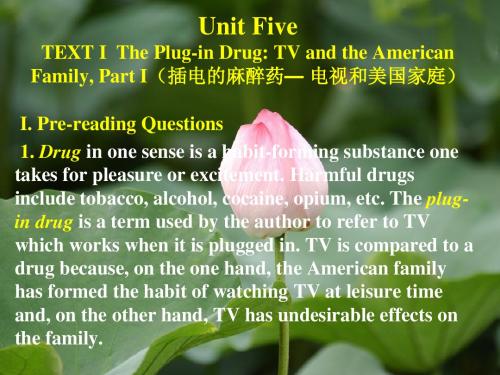
IV. Organization of the Text
• C. Negative effects (as perceived today) (Paragraphs 6 – 13): • 1. too much time devoted by children to TV-watching (Paragraphs 6 – 7) • 2. a general lack of communication within peer groups (Paragraph 8) • 3. a widening gap in the relations between children and their parents (Paragraphs 9 – 10)
Unit Five
TEXT I The Plug-in Drug: TV and the American Family, Part I(插电的麻醉药— 电视和美国家庭)
I. Pre-reading Questions 1. Drug in one sense is a habit-forming substance one takes for pleasure or excitement. Harmful drugs include tobacco, alcohol, cocaine, opium, etc. The plugin drug is a term used by the author to refer to TV which works when it is plugged in. TV is compared to a drug because, on the one hand, the American family has formed the habit of watching TV at leisure time and, on the other hand, TV has undesirable effects on the family.
新编英语教程 5 unit 10
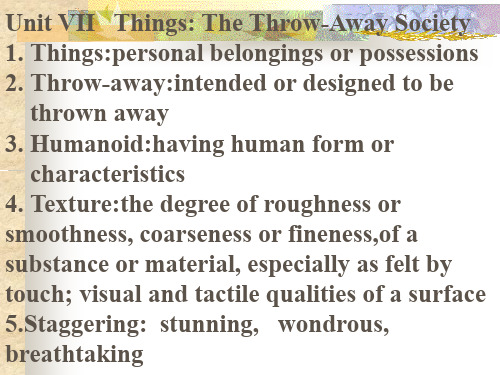
Home work: Look up in your dictionary for the usage of the following words:
1. Momentary 2. Passing 3. Temporary 4. Transient 5. Transitory
1.momentary: lasting for, done in, a moment 短暂的/ 瞬息间的/ 刹那的 At every moment 随时的 2.passing: going by; not lasting 经过的;目前 的; 短暂的
Paris
2,165,892 in 1982
Paris(Metropolitan area) 10,210,059 in 1982
Part I: Man’s relationships with things are
increasingly temporary.(thesis statement)
Unit VII Things: The Throw-Away Society 1. Things:personal belongings or possessions 2. Throw-away:intended or designed to be
thrown away 3. Humanoid:having human form or
Part II: Both objectively and subjectively, it is
revealed that man-made physical objects are
gradually take the place of natural objettitudes toward things
- 1、下载文档前请自行甄别文档内容的完整性,平台不提供额外的编辑、内容补充、找答案等附加服务。
- 2、"仅部分预览"的文档,不可在线预览部分如存在完整性等问题,可反馈申请退款(可完整预览的文档不适用该条件!)。
- 3、如文档侵犯您的权益,请联系客服反馈,我们会尽快为您处理(人工客服工作时间:9:00-18:30)。
Uniform Grading SystemTitle: Uniform Grading PolicySource: VPAAR OfficePrepared by: Vice President for Academic Affairs and ResearchApproved by: Jack O. Burns, Vice President for Academic Affairs and ResearchApplication: All campusesEffective Date: August 1, 2004Replaces: Policy of 1984 and Attachment A (1993), entitled "Uniform Grading System"I. INTRODUCTION AND STATEMENT OF PURPOSEThe University has had a uniform grading policy since 1974. The purpose of this policy is:(1) to encourage students and faculty to create and sustain a positive learning environment;(2) to create consistency of grading policy across all academic units in the CU system in those areas where such consistency is beneficial to students and to the university;(3) to maintain faculty control over grading and over the grading policy;(4) to allow individual campuses, schools, and colleges to have more restrictive grading policies than those in the Uniform Grading Policy when such restrictions are not in conflict with the Uniform Grading Policy; and(5) to provide some flexibility in grading practices for individual campuses, schools and colleges where reasonable and consistent with the intentions of the Uniform Grading Policy.The Uniform Grading Policy is found in Part II of this Administrative Policy Statement. All campuses, schools, and colleges of the University of Colorado are covered by the policy. Campuses, schools, and colleges may request exceptions to the policies in accordance with the provisions of the Uniform Grading Policy.The Uniform Grading Policy may be revised in accordance with procedures specified in the policy.II. UNIFORM GRADING POLICYThe following grading system and procedures for pass/fail registration, dropping and adding courses, and withdrawal from the University of Colorado are standardized for all campuses, schools, and colleges of the university. Any campus, school, or college may further restrict any subsection of the provisions of this policy.Grade SymbolsThe instructor is responsible for whatever grade symbol (A, B, C, D, F, IW, IF, or IP) is to be assigned. Special symbols, such as NC, W, and ***, and indications of registration or grade status are not assignedby the instructor but are automatically converted by the grade application system, explained under Special Symbols.A superior/excellent - - 4 credit points per credit hourB good/better than average - - 3 credit points per credit hourC competent/average - - 2 credit points per credit hourD below average - - 1 credit point per credit hourF failing - - no credit points per credit hourIW incomplete withdrawal - - regarded as W if not completed within a maximum of one yearIF incomplete failure - - regarded as F if not completed within a maximum of one yearIP in progress - - thesis or multi-semester course at the graduate level onlyP/F pass/fail - - P grade is not included in the grade point average; the F grade is included; up to 16 hours of pass/fail course work may be credited toward a bachelor's degree; any grade above F is regarded as passingH/P/F honors/pass/fail - - intended for honors courses; credit hours count toward the degree but are not included in the grade-point averagePlus/Minus GradesSchools and colleges may, at their discretion, choose to implement a plus/minus grading system with symbols and points as follows:A- = 3.7 pointsB+ = 3.3 pointsB = 3.0 pointsB- = 2.7 pointsC+ = 2.3 pointsC = 2.0 pointsC- = 1.7 pointsD+ = 1.3 pointsD = 1.0 pointsD- = 0.7 pointsF = 0.0 pointsGrades are awarded directly by an individual faculty member to an individual student for work done in an individual course. Therefore, the grade will be entered directly into the student's record precisely as it is awarded by the instructor of record. Students may appeal grades following established school, college, or campus procedures.Special SymbolsNC indicates registration on a no-credit basisW indicates withdrawal or drop without discredit*** indicates grades have not been received at the time grades are processedExplanation of IW and IFAn IW or IF is a grade indicating that work for the course has not been completed. Policies with respect to IW/IF grades are available in the individual college and school deans' offices.Pass/Fail Procedure1. Any student who wishes to register for a course on a pass/fail basis should do so during regular registration procedures. (Up to 16 semester hours of regular course work may be taken on a pass/fail basis and credited toward the bachelor's degree. The number of semester hours of regular course work that may be taken on a pass/fail basis and credited toward a graduate degree is determined by graduate school policy.) Changes to or from a pass/fail basis may be effected only during the period specified in campus policy.2. There are more stringent requirements in some colleges and schools. For example, some colleges or schools may require departmental approval before a student may enroll for any course on a pass/fail basis. (Schools and colleges may choose not to allow pass/fail in any courses.) Students should check with their dean's office to determine requirements.3. The record of pass/fail registration is maintained by the campus admissions and records officer.4. Only 6 semester hours of course work may be P/F in any given semester.Course ForgivenessAny policy on course forgiveness shall apply only to the campus whose faculty develops and adopts it and shall apply only to the students enrolled on that campus.Drop/Add Procedure1. Students will be allowed to drop and add within a period specified by the campus or its individual schools and colleges.2. The add period may be no longer than the first 15% of the academic term, (as mandated by the Colorado Commission on Higher Education.)3. Students seeking to add a course after the initial add period must obtain the instructor's permission.4. After the initial drop period, the student must obtain the instructor's permission in order to drop. All courses dropped after the conclusion of the initial drop period appear on the permanent record with the grade of W.5. After the 10th week, courses may not be dropped unless there are circumstances clearly beyond the student's control (accident, illness, etc.) In addition to the instruction's certification (as in 4 above), the student must petition his or her dean's office for approval to drop the course. Campuses, individual schools and colleges may have further restrictions on this time period.Withdrawal procedureIn order to withdraw from the University, the student must obtain approval of the academic dean's office and the Office of the Registrar. Notation is recorded on the student's permanent record. Students who do not officially withdraw are subject to grades of F for all course work.Amendments and Exceptions to the PolicyNo change in the Uniform Grading Policy shall be adopted unless it meets with the approval of the voting faculty within 60% of the schools and colleges.Any campus, school, or college may request a special grading policy to meet its needs. (An example is the use of H/P/F at the School of Medicine.) Such a request for exception shall be subject to approval by the Faculty Council, after review by the Educational Policy and University Standards committee (EPUS), and shall apply only to that particular unit.All changes to the Uniform Grading Policy must be initiated by the faculty of one or more academic units who will vote upon the change. Such requests for change shall be forwarded to the Executive Committee of the Faculty Council, The Executive Committee of Faculty Council shall consult the Educational Policyand University Standards committee (EPUS) before requiring the schools and colleges to conduct a ballot of their faculties regarding the change. (Faculty within the schools and colleges shall vote in accord with their established policies and procedures.) Following the positive outcome of such a ballot, the Chair of the Faculty Council shall request the administration to make any necessary revisions in this Administrative Policy Statement.Review of this policyThis policy should be reviewed on a periodic basis.。
